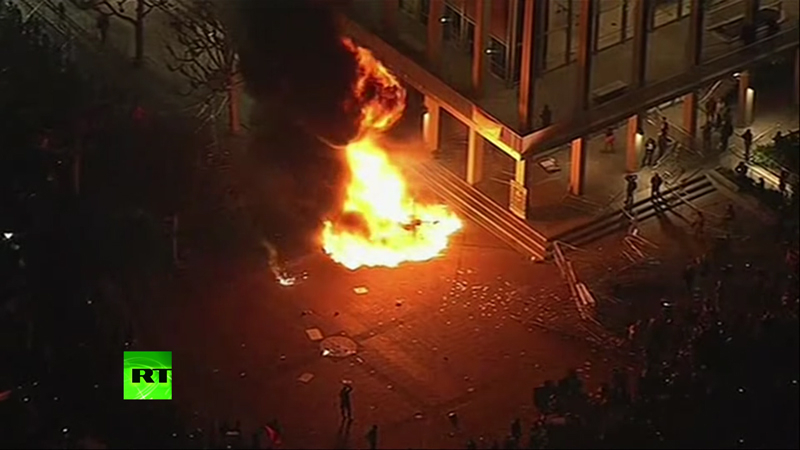I just returned from a week-long journey through Hell! It began with a visit to the Auschwitz and Birkenau death camps in Poland, as a participant of the March of the Living, following a conference commemorating the 80th anniversary of the Nuremberg Laws and the 70th anniversary of the Nuremberg Trials. My week was consumed with recurring evidence of the worst crime ever perpetrated by human beings on other human beings – the Holocaust.
I traveled from the death camps to several small Polish towns from which my grandparents emigrated well before the Holocaust, leaving behind relatives and friends. During the course of my travels, I discovered the fate of two of my relatives. Hanna Deresiewicz (an original spelling of my family name) was a 16-year-old girl living in the small town of Pilzno when the Nazis arrived; she was separated from her siblings and parents. “The soldiers took several of the most beautiful Jewish girls for sex, and then killed them. [Among those] taken [was] Hanna Deresiewicz, 16.”
Another relative named Polek Dereshowitz, served as an “orderly” to the Commandant of Auschwitz when he was 15. He was suspended “from the ringbolts in his office because a flea had been found on one of his dogs.” He was later gassed.
This is not the first time I have visited Nazi death camps. I was fully familiar with the statistical evidence of how six million Jews were systematically murdered. I was also familiar with how the Nazi death machine searched out Jews in the furthest corners of Nazi occupied Europe, even as far as the island of Rhodes in the Aegean Sea, and transported them to Auschwitz to gas them. I also knew that this was the only time in human history when people were brought from far distances to camps designed for one purpose only – to kill every possible Jew they could, find no matter where they lived. And I knew that because this was part of a planned genocide of the Jewish People, it was most important to kill every child, woman and man capable of producing future Jews.
But this visit, during which I learned the fate of two young members of my own family, brought the horrors home to me in a manner more personal than any statistic could provide. I was traveling with my wife and daughter, and I repeatedly imagined what it must have felt like for the parents and spouses of the murdered Jews to realize that everything precious to them was being annihilated, and that there would be no one left to morn them or to carry their seed to future generations.
From the old Hell, Poland, I traveled to a new Hell, called Hungary. Budapest is a beautiful city, but it too, provided a hellish end to its Jewish residents in the final months of the Second World War, when Hungarian Nazis turned the Blue Danube into a red mass grave. They shot their Jewish neighbors and dumped their bodies into the Danube River, even as the Nazis were retreating. And now in modern-day Budapest, I was told of the resurgence of Nazism among many ordinary Hungarians. An increasingly popular fascist party, Jobbik, boasts of its anti-Semitism and of its desire to rid Hungary of its few remaining Jews. The Jobbik party in Hungary also hates Israel, and everything else that is a manifestation of Jewishness.
I ended my trip meeting with a Jewish man of Greek background whose grandfather was murdered by the Nazis and who was now being targeted by Greek fascists for his outspoken defense of Israel and the Jewish people. Athens, too, has become a hotbed of Jew-hatred, with is popular fascist Golden Dawn party.

Left: Supporters of Greece’s fascist Golden Dawn party. Right: Supporters of Hungary’s fascist Jobbik party. |
There was not a moment during my visit to Europe that I was not reminded of that continent’s sordid history with regard to the Jewish people. Now, many Europeans — the children, grandchildren and great-grandchildren of those who were complicit in the murder of six million Jews — have turned against the nation state of the Jewish People with a vengeance. This time the bigotry emanates mostly from the hard left, but has the support of many on the new fascist hard right. The British Labour Party is as rife with hatred of the Jewish People and Jewish Nation as is the Hungarian fascist Jobbik party. Once again, European Jews are caught between the extremes of the Black and the Red. Extremists on both sides seek the demise of Israel, arguing that there is no place in a world with multiple Muslim and Christian nations for one state that is overtly Jewish in its character. Other Europeans seek to boycott Israel’s products, its professors, and its performers. While still others simply apply a double standard to its actions — a standard they apply to no other nation, including their own.
My visit to Europe made one thing unmistakably clear: if there is any group in the world that needs a safe homeland — a sanctuary from bigotry and hatred — it is the Jewish people. When Hitler was willing to expel them from Europe, before deciding to exterminate them, no country — not even the United States or Canada — would give them asylum. Britain closed the doors of what is now Israel to them. They had no place to go. So they were murdered by the Nazis and their willing executioners throughout Europe. There is no group whose history entitles it to a safe and secure homeland more than the Jewish people.
For reasons that are difficult to explain, the hatred of the Jewish people and its nation defies rationality, but it is as real as the gas chambers of Auschwitz-Birkenau and the emerging fascist parties of Greece and Hungary. Jews today continue to be scapegoated in many parts of the world, and their nation state is demonized at the United Nations, on university campuses, in the media and in legislative assemblies. Following the Holocaust, there seemed to be an understanding that Jews would no longer be victimized. Now, less than a century after the Nazis came to power, that moratorium on Jew-hatred seems to have expired, as the memory of the Holocaust grows dim in most parts of the world.
My week-long visit to Hell reaffirmed my commitment to defend Israel’s right to exist, to speak out for Israel when it is unfairly attacked, and to defeat its enemies in the marketplace of ideas. We owe nothing less to the victims of the worst crime in the history of humanity — a crime that could not have occurred without the complicity of most of the world. And a crime that will not recur if there is a strong and secure Israel.
Professor Dershowitz is the Felix Frankfurter Professor of Law, Emeritus and author of Taking the Stand: My Life in the Law. This article first appeared on Foxnews.com.































